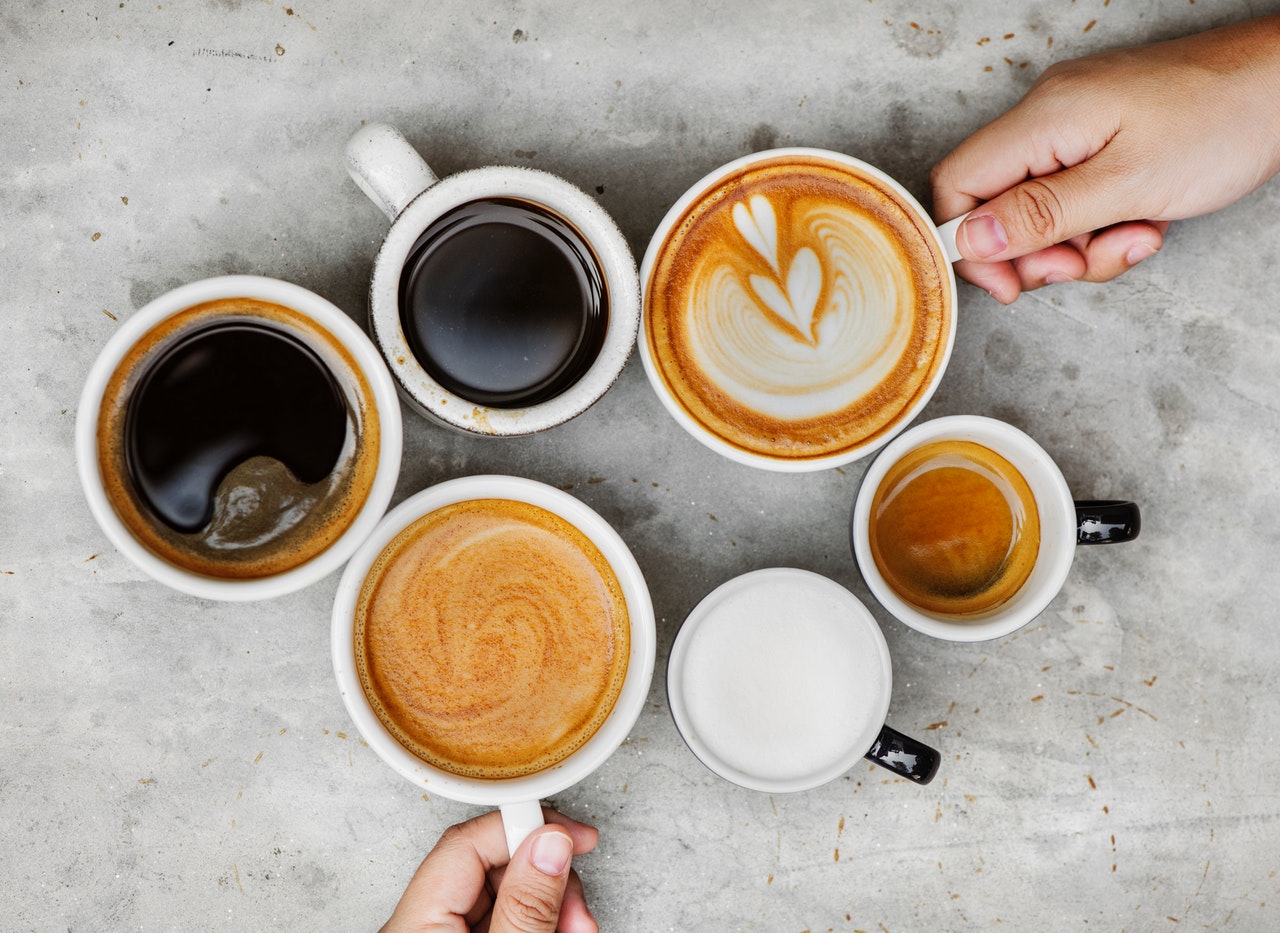
When it comes to beer there is much to talk about, write about, and tackle. Health aspects have been a recent topic in this space. Here the health angle continues but from the perspective of other drinks. The health measure, sleep. The culprit, caffeine. Beyond, or better yet because of, the added alertness, boost in energy, and mood enhancement it is worth asking what else comes along for the ride, or is left out. Caffeine and sleep are inexorably intertwined as they push against one another. A relevant place to look for caffeine impact is our overall sleep, both in quantity and quality.
O Coffee! Thou dost dispel all care, thou are the object of desire to the scholar. This is the beverage of the friends of God. —“ In Praise of Coffee,” Arabic poem (1511) 1
I performed a rough tracking of my caffeine intake in order to get an idea of consumption, with hopes of gaining insight on whether or not I was overdoing it. As a recent, though not exactly young, father it has become critical to take care of my energy reserves. There is a long day ahead, with others behind it that seem to stack up indefinitely. The weekends are often times nothing more than milestones zipped by, viewed more clearly in the rearview mirror then experienced in the moment. Coffee has been a necessity but even with this crutch I have found my energy being occasionally insufficient. Could it be that my coffee intake was ironically part of the problem, getting me (more) tired in the long run?
I tracked daily intake for 11 days, granting myself the assumption that by morning I started back at 0 mg of caffeine. By the second or third day it was clear this could not be true but I stuck with the naive recording process to avoid complication. With a half-life between 5 to 7 hours, and a half hour fuse to hit its peak, you can expect that 24 hours after ingesting caffeine something like 5% of it will linger on in your body. That caffeine has been with you everywhere you have been, most crucially to bed and throughout your slumber, or attempts at sleep and dreaming.
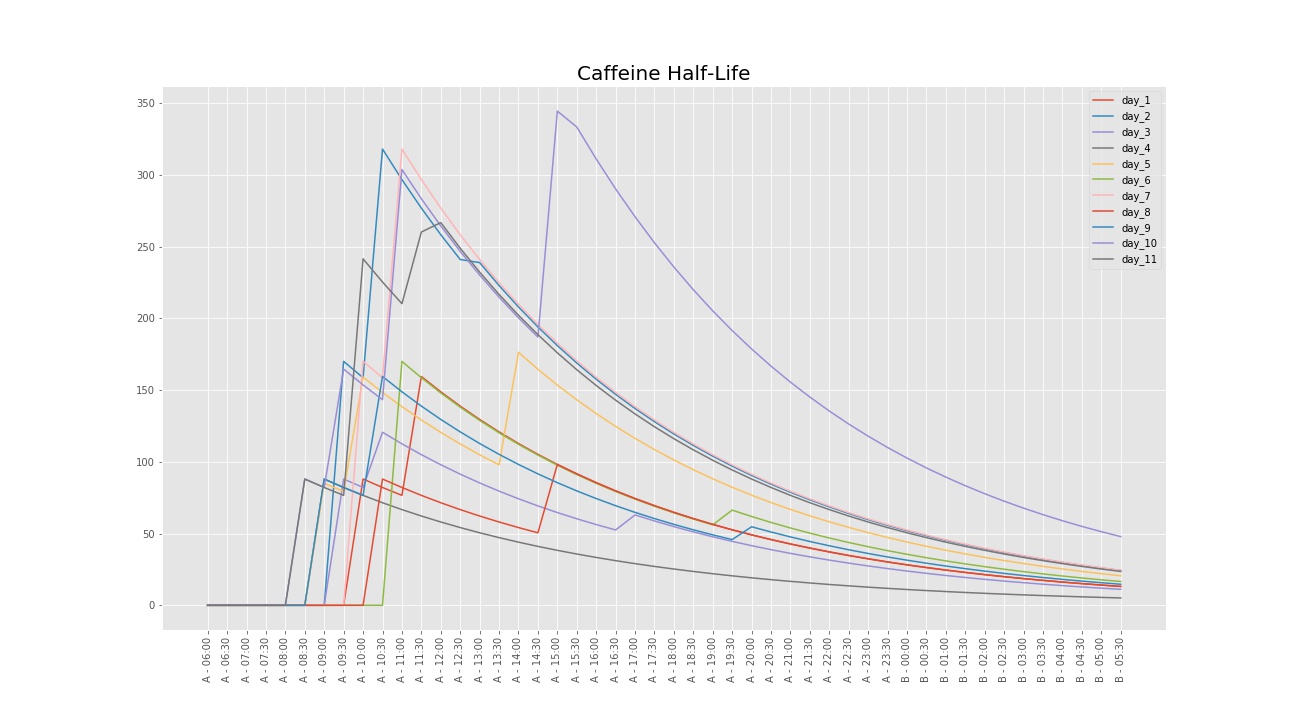
I speak mostly of coffee because I kicked the soda habit in my 20’s, have not taken to tea with any regularity and do not mess with energy drinks which seem so clearly detrimental that they should only be used to power through after a sleepless night. There is of course dark chocolate, also included in the tracking chart.
“Sleep is the chief nourisher in life‘s feast“ Macbeth, Act II Scene 2
Sleep is a wonderful rejuvenating activity that has for far too long in our gogo society been getting a short shift (the third shift, if you will). Sleep, however is having a moment2 and looks to take its rightful place among diet and exercise, perhaps ahead of them, as a critical pillar to a healthy mind, body, and overall well being.
“Sleep, pfff. I’ll catch up when I’m dead.” Many of us by not protecting our sleep are quickening the arrival of that permanent sleep and suffering more along the way than we have to. It has become increasingly clear that cutting back on sleep leads to a host of bad health outcomes, both short-term and later in life (all things your Grandma could’ve told you). On the flipside, the benefits of consistent good sleep habits are practically too good to be true and might be brushed aside as quackery if they were pushed on us in the form of a pill:
“makes you live longer, enhances your memory and makes you more creative, it makes you look more attractive, it keeps you slim and lowers food cravings, it protects you from cancer and dementia, it wards off colds and the flu, it lowers your risk of heart attack, stroke and diabetes, you’ll feel happier, less depressed, and less anxious… are you interested?” [WWS]
As anyone with children will tell you sleep is essential to keeping your mind, mood, and marriage together. Unfortunately there are a ton of ways we go about ruining the amount and quality of our sleep. Common among these is caffeine intake. This most widely consumed psychoactive drug3 is enjoyed the globe over, across generations in a variety of methods.4 My preferred vehicles are coffee and dark chocolate - I suppose you can imagine what my favorite beer styles are as a result.
O Coffee! Thou dost dispel all care, thou are the object of desire to the scholar. This is the beverage of the friends of God. —“ In Praise of Coffee,” Arabic poem (1511)
Over the past several months I had been sufficiently convinced of caffeine’s detrimental impact on sleep quality and its “staying around-ness” (5 to 7 hour half-life) to have already stopped drinking coffee after two in the afternoon, even moving that back to one on most days. I found an afternoon postprandial espresso, latte, or plain coffee too irresistible to turn down completely.
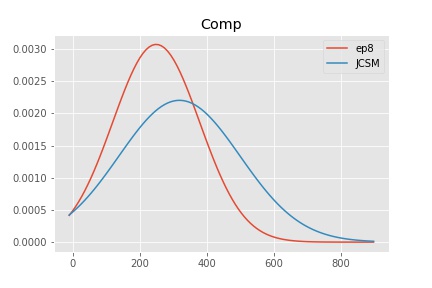
My shying away from afternoon coffee is a practice more people can benefit from. Some 90% of adults consume caffeine between noon and six in the evening with nearly 70% later still through midnight. This could be more difficult than simply abstaining from coffee as “[c]affeine content in beverages and foods is increasing in terms of dose and availability… the average person consum[ing] 319.32 +/- 180.94 mg of caffeine per day [JCSM, note 12].” my initial threshold of 50 mg of caffeine by bedtime was mostly a made up round number, though not as arbitrary in fact as in selection: 200 mg of caffeine 16 hours before bedtime were shown to affect sleep. [JCSM, note 29]. Considering a half-life falling between five and seven hours, these 200 mg would be at 50 mg when it was time to lie down for the evening. Taking a higher dosage of 400 mg we see that sleep is impacted in a number of ways, regardless if taken at bedtime, three hours before or six. Sleep was disrupted when it came to total sleep time, time it took to fall asleep, and wake time during sleep [JCSM].
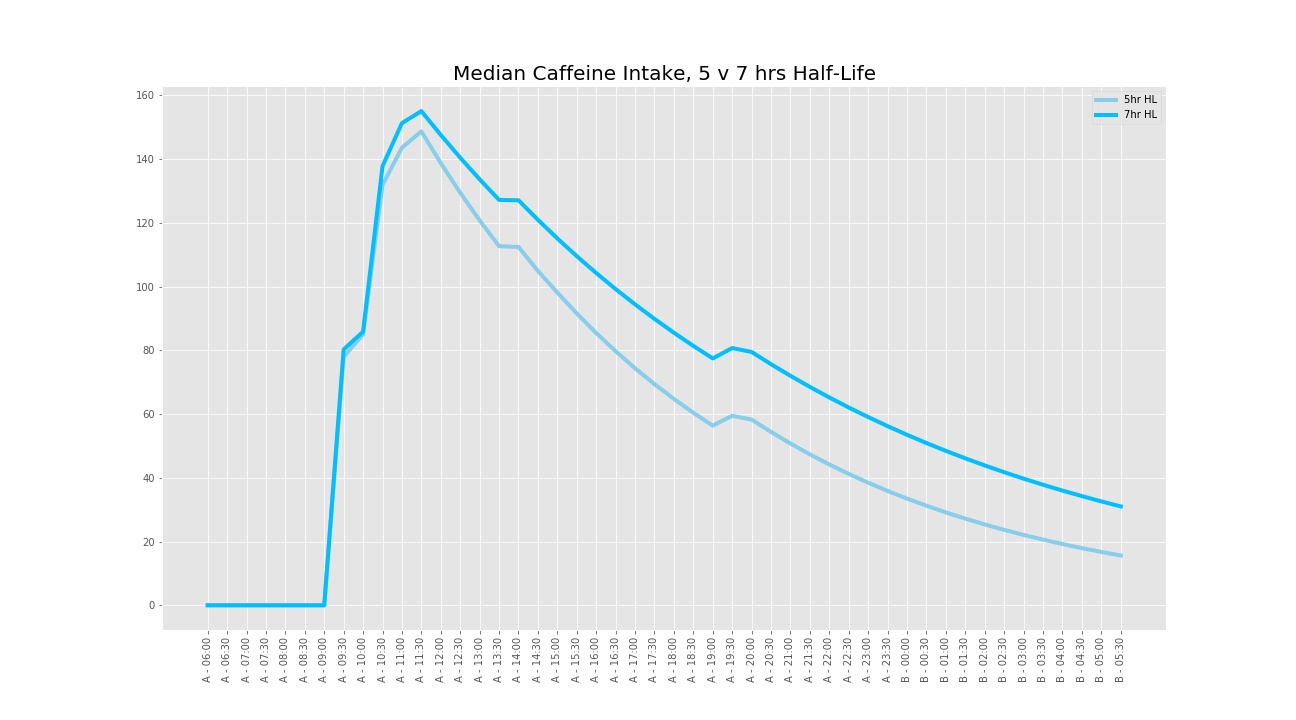
Of the sleep parameters disturbed one in particular stood out as noticeably different between subjective reporting and objective measuring, wake time during sleep. This discrepancy in awareness versus experiencing sleep fragmentation could hint at why more of us do not appreciate the impact that our caffeine intake has on our recuperative efforts. More worrisome yet, we may fall into a vicious cycle of upping our caffeine intake to makeup for our lethargy, causing further sleep disruption and relying on further caffeine escalation.
Past listing the outcomes of high caffeine intake on sleep performance the question of how this comes about may still linger. “Caffeine works its invigorating magic by occupying, blocking and effectively deactivating the atanoscene receptors in our brain. Our sleepiness signal is blocked and we are fooled into feeling awake [WWS].” Moreover, there is evidence, both in human and animal studies, that caffeine can postpone the internal circadian rhythm thereby pushing out the release of melatonin [STM]. As a result our sleep and tired regulation does not happen at or around our intended bedtime but hours after we have already been in bed. This helps explain some of the disruption in both quantity and quality.
A bit unnerving, though hardly surprising that there would be physical repercussions.5 However, the theme of bodily change goes further still, or rather deeper. Prolonged sleep disruption not only raises risks to a host of first world health problems, a murderers’ row of afflictions (think the reverse of the too good to be true benefits listed earlier6), but even changes our DNA.
The voodoo priest and all his powders were as nothing compared to espresso, cappuccino, and mocha, which are stronger than all the religions of the world combined, and perhaps stronger than the human soul itself. —Mark Helprin, Memoir from Antproof Case (1995)
Skip forward a week after tracking and I stopped all caffeine intake. Cold turkey. For a week. At first I really needed to speak in short sentences. And repeat myself. In short sentences. But things went smoother soon after and I since reintroduced dark chocolate in the second week, tea in the third (as a substitute, a crutch?). How is it? Again, fine now. Energy is good and sleep is definitely no worse,7 most likely better as energy is less of an issue. It was undeniably rough in the get go, experiencing withdrawal symptoms, most notably in the form of headaches (approximately three days).
I felt these withdrawals once before in my early 20s but then it had to do with soda, Coca-Cola specifically. I cannot remember how it started; my job and its long hours, plus the company-paid dinners almost certainly were the main drivers, but I remember realizing that I could not finish a lunch without going for a can of Coke. It was the sweetness, the carbonation, the shot of energy, the whole thing wrapped up together in an irresistible package. When the thought first occurred I might need a drink I was curious. A bit skeptical I found the idea amusing. I observed myself for a couple of days and noticed that the craving which originally gave me my insight was no fluke, its echo returning each day, about the same time, in the same settings to stoke my desire. I figured this was probably not a good thing (I was letting myself down gently). With a bit of time, almost like someone pumping themselves up to bungee jump I took the dive and stopped.
“It is disgusting to notice the increase in the quantity of coffee used by my subjects, and the like amount of money that goes out of the country in consequence. My people must drink beer. His Majesty was brought up on beer, and so were his ancestors.” -Frederick the Great
Now a month without coffee and I hardly miss it. When I do it is from the social, habitual and taste point of view (it is these multiple angles that make many habits difficult to begin or break, e.g. working out and cigarettes, respectively). Even before I became a regular coffee drinker I enjoyed the smell. Still do. But it is not as if I have sworn off the stuff, I am just trying to get some better quality sleep and recovery by taking a break. Moreover, I am not a monk and staying away from caffeine altogether. There is still the occasional dark chocolate and more frequent tea drinking.
This has been an experiment, several in fact, from tracking, to prepping, to actually stopping, and now observing the fallout. Ultimately a “re-introduction” will come, most likely with further limitations than before, both in quantity and frequency of coffee moving forward. The late morning cut off was a good start but the high caffeine dosage packed in each cup of coffee and extended half-life require still further fine-tuning.
Like a veteran athlete who adds tricks and moves to his repertoire to stay competitive we aging beer aficionados need to find ways to stay “active.”
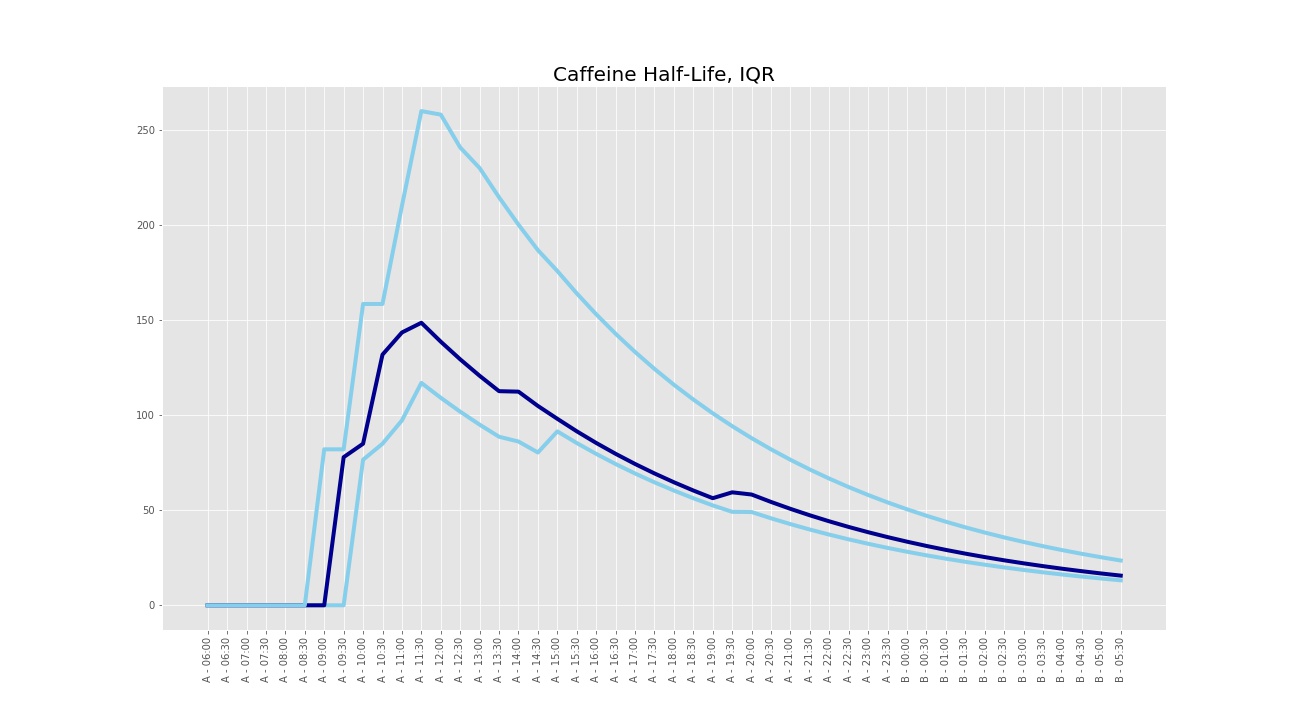
Notes
Opening photo by rawpixel.com from Pexels
[JCSM] Drake et al. Caffeine Effects on Sleep Taken 0, 3, or 6 Hours before Going to Bed. Journal of Clinical Sleep Medicine 2013; http://dx.doi.org/10.5664/jcsm.3170
[STM] Burke et al. Effects of caffeine on the human circadian clock in vivo and in vitro. Science Translational Medicine 2015; DOI: 10.1126/scitranslmed.aac5125
[WWS] Walker, M. (2017). Why We Sleep: Unlocking the Power or Sleep and Dreams
1 Non-Macbeth quotes lifted from: Pendergrast, M. (2010). Uncommon Grounds: The History of Coffee and How It Transformed Our World ↩
2 Three popular audience books come readily to mind: The Sleep Revolution, Sleep Smarter, Why We Sleep. ↩
3 “Caffeine itself is not a food supplement but rather the most widely used and abused psychoactive stimulant in the world.” [WWS] ↩
4 “The consumption of caffeine represents one of the longest and largest unsupervised drug studies ever conducted on the human race. Perhaps only rivaled by alcohol.” [WWS] ↩
5 Speaking as a materialist, where else would the changes take place? ↩
6 One street philosopher said “sleep is the cousin of death.” He had the intertwined nature of the two right but it would be more appropriate to modify it to “sleeplessness is the cause of death.” ↩
7 Again, the unreliability of self reporting. ↩
Code @nbviewer